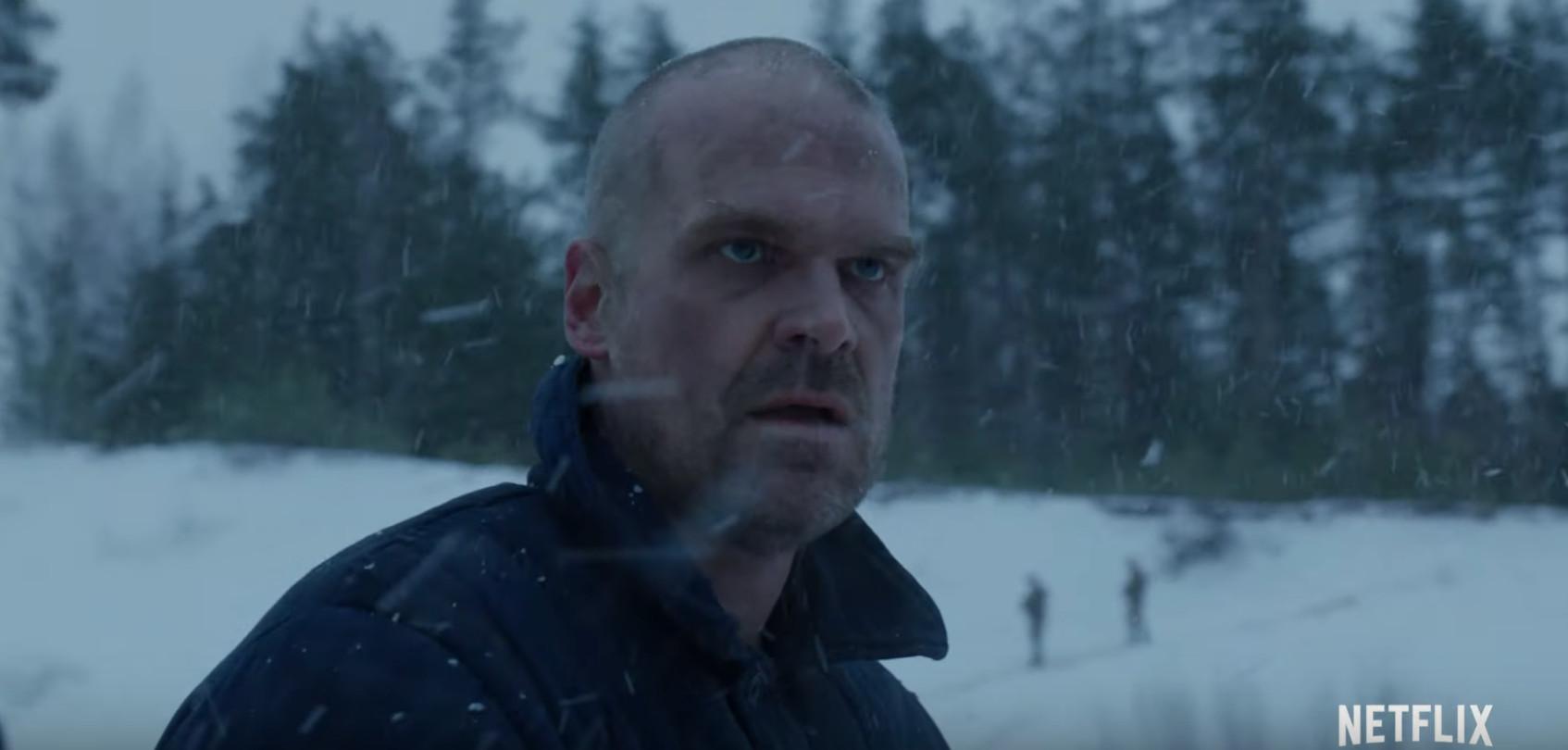If there’s an axiom that represents the past decade in pop culture, it’s that no major character who dies actually stays dead. Jon Snow was revived by Melisandre to—I don’t know—act even more mopey and watch Arya Stark kill the Night King. Han Seoul-Oh, perhaps through a different form of necromancy, is inexplicably going to appear in Fast 9. Somehow, Palpatine has returned, etc. And now, after an emotionally devastating finale that seemed to kill Hawkins, Indiana’s police chief Jim Hopper, Stranger Things wasted no time confirming that the lord of dad bods is, in fact, alive in Season 4. Once again, the dead speak—and are part of a Russian chain gang!
It’s not much of a silver lining, seeing as Hopper is basically a Russian prisoner of (interdimensional?) war in a remote, wintry outpost led by the guy (Tom Wlaschiha) who played Jaqen H’ghar on Game of Thrones. Hopper shaved his head, making him look like the kind of dude who’d post a 45-minute screed on YouTube about why Joker is a masterpiece and should’ve won Best Picture:

If you’d like an explanation as to how a man who appeared to die in a secret Russian laboratory explosion in Indiana somehow ended up in Russia, the first Season 4 log line doesn’t provide much detail. “We’re excited to officially confirm that production on Stranger Things 4 is now underway—and even more excited to announce the return of Hopper!” the Netflix press release reads. “Although it’s not all good news for our ‘American’; he is imprisoned far from home in the snowy wasteland of Kamchatka, where he will face dangers both human … and other. Meanwhile, back in the States, a new horror is beginning to surface, something long buried, something that connects everything … ” (If you want to actually read deeper into this, the teaser is titled “From Russia with love,” which could indicate Season 4 is going to shamelessly evoke James Bond for its next adventure.)
I think it’s safe to say Stranger Things has jumped the shark—er, the Demogorgon. There was a time when the Duffer Brothers envisioned Stranger Things as an anthology series, but the fervor around what was an excellent first season—and perhaps just as important, a talented cast of adorable young stars led by Millie Bobby Brown and Finn Wolfhard—led them to keep the story in Hawkins. And now we’re going to get four—and possibly five—seasons with the same ensemble. There is something messed up about a show pandering to ’80s nostalgia now pandering to its own nostalgia.
I mostly liked Stranger Things’ third season. But that’s in part because the Duffers seemed like they had the courage to make a radical change to the show’s status quo—killing off Hopper for real would’ve forced characters like Eleven to navigate an uncertain future, and proved that Stranger Things wasn’t all about pandering to fans’ wants and needs. Instead, as the action goes beyond Hawkins and widens its scope—pass the kulich, David Harbour—the series’ ambitions grow smaller. Hopper isn’t really dead. The kids, who are now hormonal teens, are once again going to save the day (and maybe the world?) without provoking any fears of meaningful losses or stakes—no offense to Barb.
In fairness, the third season was quite obviously setting this up—a post-credits scene revealed an unseen “American” prisoner in Russia, and that the Soviets had captured a (the OG?) Demogorgon. But I naively assumed the series wasn’t run by complete cowards, and that said prisoner could’ve been Matthew Modine’s Dr. Brenner, the evil scientist who initially experimented on Eleven and gave her telekinetic powers. I ignored all the signs, including Harbour conceding that Hopper was “most likely” the character behind Russian bars.
Nevertheless: Shame on you, Stranger Things. There’s still a chance the fourth season is strong—it will surely have fun moments, glorious Joe Keery hair, solid production value, and I doubt the dank synth theme is going anywhere. But avoiding the chance to be the small-screen equivalent of The Rise of Skywalker is not exactly #ContentGoals. Worse yet, Hopper’s revival retroactively renders the third season, particularly its solid and tear-jerking finale, into a cynical and emotionally manipulative enterprise that misses what makes the ’80s pop culture so great.
Without stakes or pathos—and with a healthy helping of plot armor for Hopper and the gang—Stranger Things confirms its standing as empty calorie entertainment, complete with inexplicable character revivals and cliff-hanger post-credit scenes. (Martin Scorsese might as well call it a theme park.) That’s a fine standard for some shows to set; most shows, however, don’t score Emmy nominations. Stranger Things is what it is, and lots of people are still going to love it. But I’m going to rue the Duffer Brothers’ chances to pull no punches and aim for something great, back when their guiding principles weren’t flipped Upside Down.
